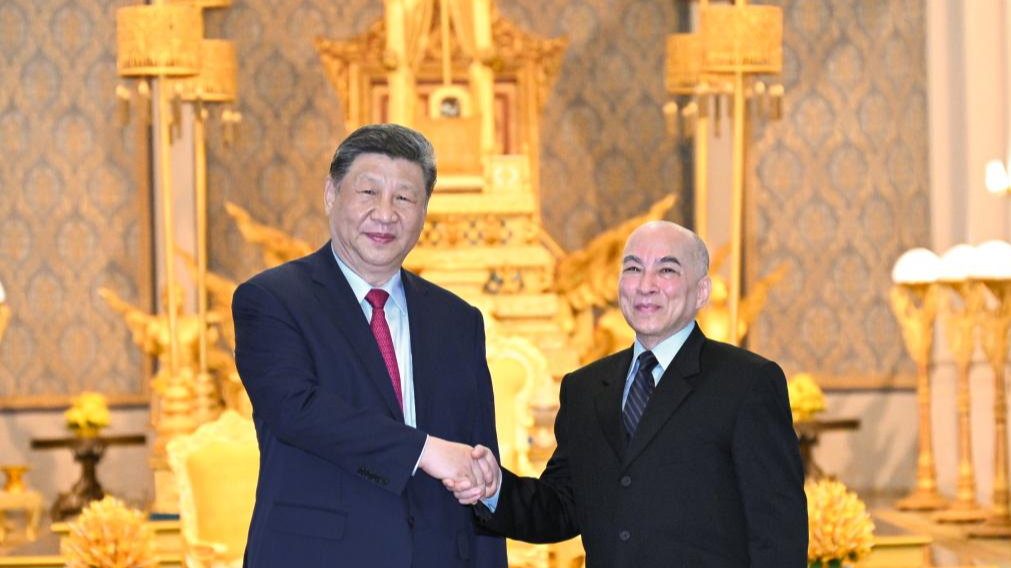By continuing to browse our site you agree to our use of cookies, revised Privacy Policy and Terms of Use. You can change your cookie settings through your browser.
I agree
Search Trends
CHOOSE YOUR LANGUAGE
- Albanian Shqip
- Arabic العربية
- Belarusian Беларуская
- Bengali বাংলা
- Bulgarian Български
- Cambodian ខ្មែរ
- Croatian Hrvatski
- Czech Český
- English English
- Esperanto Esperanto
- Filipino Filipino
- French Français
- German Deutsch
- Greek Ελληνικά
- Hausa Hausa
- Hebrew עברית
- Hungarian Magyar
- Hindi हिन्दी
- Indonesian Bahasa Indonesia
- Italian Italiano
- Japanese 日本語
- Korean 한국어
- Lao ລາວ
- Malay Bahasa Melayu
- Mongolian Монгол
- Myanmar မြန်မာဘာသာ
- Nepali नेपाली
- Persian فارسی
- Polish Polski
- Portuguese Português
- Pashto پښتو
- Romanian Română
- Russian Русский
- Serbian Српски
- Sinhalese සිංහල
- Spanish Español
- Swahili Kiswahili
- Tamil தமிழ்
- Thai ไทย
- Turkish Türkçe
- Ukrainian Українська
- Urdu اردو
- Vietnamese Tiếng Việt
Copyright © 2024 CGTN.
京ICP备20000184号
CHOOSE YOUR LANGUAGE
- Albanian Shqip
- Arabic العربية
- Belarusian Беларуская
- Bengali বাংলা
- Bulgarian Български
- Cambodian ខ្មែរ
- Croatian Hrvatski
- Czech Český
- English English
- Esperanto Esperanto
- Filipino Filipino
- French Français
- German Deutsch
- Greek Ελληνικά
- Hausa Hausa
- Hebrew עברית
- Hungarian Magyar
- Hindi हिन्दी
- Indonesian Bahasa Indonesia
- Italian Italiano
- Japanese 日本語
- Korean 한국어
- Lao ລາວ
- Malay Bahasa Melayu
- Mongolian Монгол
- Myanmar မြန်မာဘာသာ
- Nepali नेपाली
- Persian فارسی
- Polish Polski
- Portuguese Português
- Pashto پښتو
- Romanian Română
- Russian Русский
- Serbian Српски
- Sinhalese සිංහල
- Spanish Español
- Swahili Kiswahili
- Tamil தமிழ்
- Thai ไทย
- Turkish Türkçe
- Ukrainian Українська
- Urdu اردو
- Vietnamese Tiếng Việt
Copyright © 2024 CGTN.
京ICP备20000184号
互联网新闻信息许可证10120180008
Disinformation report hotline: 010-85061466













U.S. President Donald Trump signs an executive order on "reciprocal tariffs" at the Rose Garden of the White House in Washington, D.C., the United States, April 2, 2025. /Xinhua
Editor's note: Paul Frimpong, a special commentator on current affairs for CGTN, is founder and executive director of the Africa-China Centre for Policy & Advisory (ACCPA). The article reflects the author's opinions and not necessarily the views of CGTN.
U.S. President Donald Trump has recently announced sweeping reciprocal tariffs, imposing a baseline 10 percent duty on imports from all trading partners – including most African nations.
The U.S. government's decision to impose tariffs on African imports follows a broader trade protectionist agenda that aims to curb trade imbalances and support U.S. industries. The administration argues that tariffs will encourage domestic production by reducing foreign competition, especially in industries like steel, electronics, and machinery.
In respect of Africa, the new tariff regime could prove particularly harmful, particularly in the short term. The continent's trade with the U.S. primarily consists of raw commodities such as oil, minerals, and agricultural products, which are highly sensitive to changes in international trade policies.
Again, while the baseline 10 percent duty applies broadly, higher rates target specific economies in Africa, such as Lesotho with a 50 percent tariff, the highest globally outside China and South Africa which has been given a 30 percent general tariff, plus a separate 25 percent levy on vehicle imports. Equally, Nigeria and Madagascar have been hit with 31 percent and 47 percent tariffs, respectively.
The imposition of tariffs by the U.S. could have both short-term and long-term economic effects on African countries. In the short term, African exporters could face higher costs for doing business with the U.S. As many countries on the continent rely on exporting natural resources, the price hikes resulting from tariffs will likely undermine the profitability of these exports. For example, countries like Nigeria, Angola, and South Africa, which export oil and minerals to the U.S., could see reduced revenues, straining their budgets and economic stability.
A significant portion of African trade remains heavily focused on raw commodities, making the continent vulnerable to fluctuations in global commodity prices and now, potentially, to tariffs as well.
Moreover, the tariffs may lead to inflationary pressures in African countries. Imported goods from the U.S., such as machinery, vehicles, and electronics, will likely become more expensive, increasing production costs and raising the price of consumer goods. Higher export costs also threaten macroeconomic stability. Ghana and Zambia, already in debt default, face compounded risks as tariffs inflate production costs and reduce foreign exchange earnings. The Center for Global Development warns of cascading effects: rising interest rates, currency depreciation, and reduced public spending on health and infrastructure.
A worker reacts while others use sewing machines at the Afri-Expo Textile Factory in Maseru, Lesotho, March 19, 2025. /CFP
While the U.S. tariff policy undoubtedly presents significant challenges for African countries, it also offers opportunities for strategic adaptation. One key opportunity lies in the strengthening of regional integration within Africa. The AfCFTA could be a game-changer in this regard. By focusing on increasing trade within the continent, African countries can begin to reduce their reliance on global players like the U.S. and instead tap into Africa's growing middle class, which is expected to reach 1.1 billion people by 2030. This shift could provide a buffer against external shocks, such as tariffs, and foster more resilient economies.
Additionally, China presents a highly compelling alternative for Africa's economic growth. First and foremost, China's rapidly growing middle class offers African countries access to an expanding consumer market for their goods and services. With more than 1.4 billion people, China represents an enormous potential market for African exporters, particularly in agriculture, textiles, and manufactured products. Unlike the U.S., which has been increasingly inward-looking, China's global economic strategy, particularly through initiatives like the BRI, ensures that Africa remains a key partner in its economic vision.
Moreover, China's commitment to Africa is reflected not only in trade but also in its long-term development investments. The country has consistently supported African nations in building essential infrastructure, ranging from roads and bridges to telecommunications networks. This is critical, especially for landlocked countries that face significant logistical challenges in accessing global markets. By strengthening Africa's infrastructure and industrial capacities, China enables African countries to reduce their dependence on foreign imports, lower trade barriers within the continent, and enhance intra-Africa trade.
While the new U.S. tariffs present immediate challenges for African economies, they also provide an opportunity for Africa to pivot towards more strategic, long-term partners. Among the most viable options is China, whose robust trade relations, investments in infrastructure, and commitment to industrialization make it an indispensable partner for Africa's economic future. As Africa continues to navigate the global trade landscape, a deepening partnership with China, along with greater regional integration through the AfCFTA, can help mitigate the negative impacts of external shocks like tariffs and foster a more resilient, diversified continent.
(If you want to contribute and have specific expertise, please contact us at opinions@cgtn.com. Follow @thouse_opinions on X, formerly Twitter, to discover the latest commentaries in the CGTN Opinion Section.)